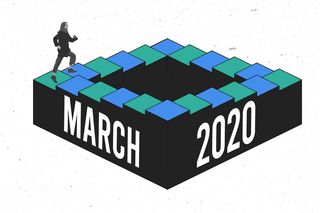
Why Did March 2020 Feel Like It Would Never End?
When we’re bored, or constantly anticipating what will happen next, time passes more slowly.

For anyone who hates social constraints such as punctuality, the concept of time being a construct is appetizing. Quarantine, however, has made us reconsider how we experience time passing by—as seconds, minutes, days, and weeks melt into each other, I have never more craved the rigid structure of the twenty-four-hour day.
While time is technically dictated by the turning of the earth, our perception of it is merely a neural construct. According to neuroscientist David Eagleman, because our perception of time is intricately connected to emotions and memories, our brain filters that information before presenting it to us. “Time is a construction of the brain, and the brain goes through a lot of trouble to edit and present this story to you of what’s going on out there and how fast or slowly it happens,” Eagleman told the Los Angeles Times.
This means that the time we spend stuck at home, quarantined, passes either slow or fast depending upon how we react to any event. Eagleman believes there are two different ways to perceive time—prospective and retrospective. When we perceive time prospectively, our brain attempts to anticipate what will happen next. When we view time prospectively while preoccupied with something, the brain is too distracted to anticipate, which means that time will seem to pass faster. But when we’re bored, we’re constantly anticipating what’s about to happen next, which has the opposite effect and makes it seem like time is passing at an agonizingly slow rate.
Related on The Swaddle:
Men Spend More Time in Leisure Activities, But Women Enjoy Leisure Time More
When thinking about our memories, or perceiving time retrospectively, we’re a lot likelier to remember things that startled or interested us to a greater extent. A richer, more filled-out memory of an event makes it seem like it took longer—simply because there’s so much to remember. On the flip side, in retrospect, we barely remember our boredom, as there was nothing of note to remember.
As we remember March 2020 retrospectively now, it feels protracted, because there was much to keep us busy—news about the pandemic, adjusting to a new workflow, and the idea of quarantine and its implications. At present, while the quarantine drags on, we’re perceiving time prospectively—the news is all starting to sound like what we’ve heard before, we’ve settled into a routine, and we can’t stop anticipating the end, which makes each day seem long and tedious. Retrospectively (and hopefully), we’re barely likely to remember much of this time.
Unless, of course, there is a way to remember our time in quarantine differently. If our perception of time is a construct, that means it can be manipulated. If we can find a way to keep ourselves occupied with something new and interesting, rather than things that merely keep us busy, time may feel like it’s passing by faster, but we’ll remember it more positively.
According to Eagleman, our perception of time expands when we sense something new. In an experiment, participants divided into two groups were shown consecutive images of a shoe over a long period of time. In one of the groups, the images were briefly interspaced with images of a flower. Individuals who saw this set of images believed that the flower stayed on screen longer, even though the flower stayed on screen for the same amount of time as the shoe. This phenomenon is called repetition suppression. Whenever something new happens, our brains use more cognitive energy to make sense of it, capturing a large amount of detail, which makes it seem as though we experienced it for a longer period of time.
That is, our only hope to prevent slow time perception from turning our brain to jelly is feeding it more stimuli. While this may not ease the tension of living through a pandemic, it may give us something more than just the pandemic to remember.
Aditi Murti is a culture writer at The Swaddle. Previously, she worked as a freelance journalist focused on gender and cities. Find her on social media @aditimurti.
Related


Centre’s Insurance Scheme for Healthcare Workers Covers Death, Not Treatment Costs
